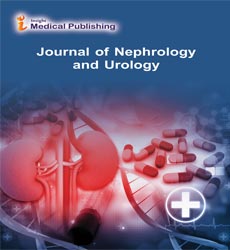Advancements in Nephrology
Akihiko Yamamoto*
Department of Nephrology and Endocrinology, The University of Tokyo Hospital, Bunkyo City, Tokyo, Japan
- *Corresponding Author:
- Akihiko Yamamoto
Department of Nephrology and Endocrinology
The University of Tokyo Hospital
Bunkyo City, Tokyo
Japan
E-mail: yamakihiko02@outlook.jp
Received Date: May 22, 2021; Accepted Date: June 04, 2021; Published Date: June 11, 2021
Citation: Yamamoto A (2021) Advancements in Nephrology. J Nephrol Urol Vol.5 No.3: e001.
Description
Chronic kidney disease (CKD) affects over thirty million Americans and more than eight hundred million people worldwide, making it a significant public health problem. Despite its prevalence, CKD lacks effective therapeutics with patients requiring dialysis or kidney transplants to survive. Variable genetic and environmental factors influencing disease development further complicate treatment. On September 25, 2020, the New York Academy of Sciences hosted the Drug Discovery for Remission of Chronic Kidney Disease symposium. Renal artery stenosis (RAS) can lead to a reduction in kidney blood flow with resultant ischemia of the affected kidney. The consequences of this reduction are a decline in estimated glomerular filtration rate (eGFR) and activation of the renin-angiotensin-aldosterone system (RAAS) with the development of renovascular hypertension. Historically, stenting of RAS was believed to reverse the decreased blood flow and lessen the activation of the RAAS. The most common cause of RAS is atherosclerotic renal artery stenosis (ARAS), which is responsible for up to 90% of the cases of renovascular disease.
Immunotherapy is a process where certain medications are used to boost your immune system to increase its ability to fight off abnormal cells. This type of treatment has been used in cancer therapies, including those that help treat kidney cancer. Depending on your situation, your doctor may recommend immunotherapy as either a first-line or second-line treatment. However, it’s also important to know that some of these therapies pose serious side effects, and their effectiveness may be limited in advanced forms of kidney cancer.
The incidence of renal cell carcinoma (RCC) has steadily risen over the past 10 years and accounts for 2-3% of all adult malignancies. Metastatic RCC (mRCC) is associated with a poor prognosis; historically, 5-year survival was around 8% but that is rapidly improving. For many years, the only treatment for mRCC approved by the US Food and Drug Administration (FDA) was high dose interleukin-2 (HD IL-2; Proleukin, Prometheus Laboratories Inc., San Diego, CA). The 1992 approval was based on data from a number of clinical trials demonstrating consistent objective response rates, including durable complete responses (CR) in select patients. However, the use of HD IL-2 is associated with short-term toxicity, and requires hospitalization and management by specialist teams experienced in HD IL-2 therapy. In addition, only a minority (15%) of patients respond to treatment, based on data in the package insert.
The Kidney Research Institute (KRI) has been chosen to engineer a kidney tissue chip to predict drug safety. The aim is to design human tissue chips that replicate human organs in order to test drugs in their early stages to see if they will cause complications to the organs. Dr. Jonathan Himmelfarb and his colleagues propose to design, implement and test a tissue engineered human kidney microphysiological system. According to Dr. Himmelfarb, “this is a new and very exciting direction for the Kidney Research Institute, in multidisciplinary partnership with our many UW colleagues.”
A few small randomized trials began in the late 1990’s to determine a competitive advantage of angioplasty for RAS. The EMMA study group looked at 49 total patients, but was not able to find any improvements with angioplasty at six months. Similarly the Scottish and Newcastle collaborative group in the same year did not find any difference with angioplasty in a total cohort of 135 patients with the longest follow up of 54 months. A Dutch group as well looked at 106 patients split into medical therapy versus angioplasty and duplicated the results of no difference at 12 months in systolic pressure, medication use, or decreased kidney function. All of these trials had limitations of short time frames, high (29% average) crossover rate, and small cohorts that may have lacked power to adequately determine differentiation.
There are many different types of immunotherapy, so it’s difficult to give an estimate of the overall success rates for treatment. However, research has helped to reveal some trends that may improve treatment outlook. For example, combination therapies that use immunotherapy with a targeted therapy are thought to be more successful in treating advanced kidney cancer than using each treatment individually. Several studies have demonstrated that combining treatments can improve progression-free survival, the amount of time that patients go without their disease worsening. Many of these trials compare combination immunotherapy treatments to targeted therapy with a tyrosine kinase inhibitor (TKI) medication called sunitinib (Sutent), which discourages tumor growth.
Open Access Journals
- Aquaculture & Veterinary Science
- Chemistry & Chemical Sciences
- Clinical Sciences
- Engineering
- General Science
- Genetics & Molecular Biology
- Health Care & Nursing
- Immunology & Microbiology
- Materials Science
- Mathematics & Physics
- Medical Sciences
- Neurology & Psychiatry
- Oncology & Cancer Science
- Pharmaceutical Sciences
